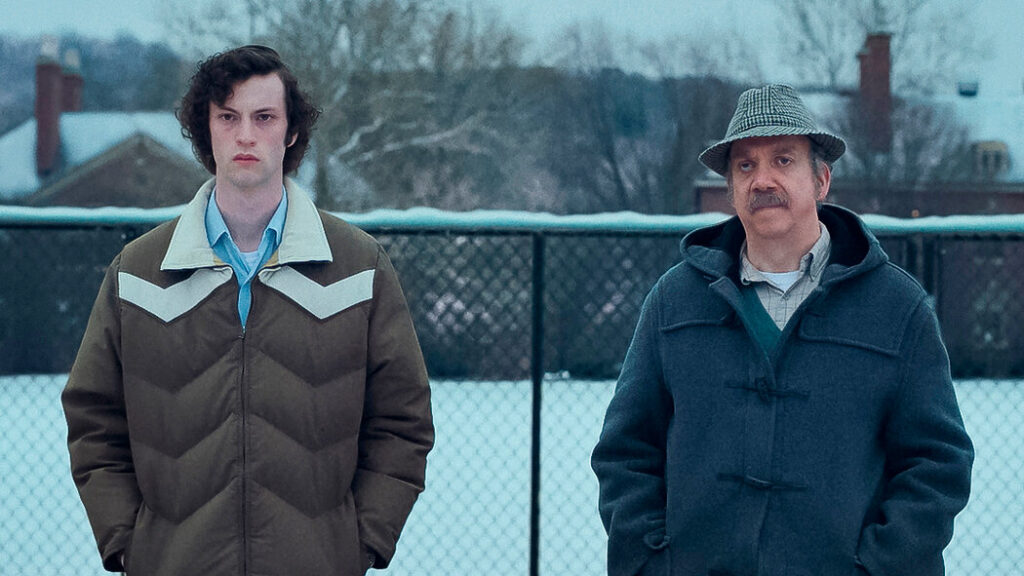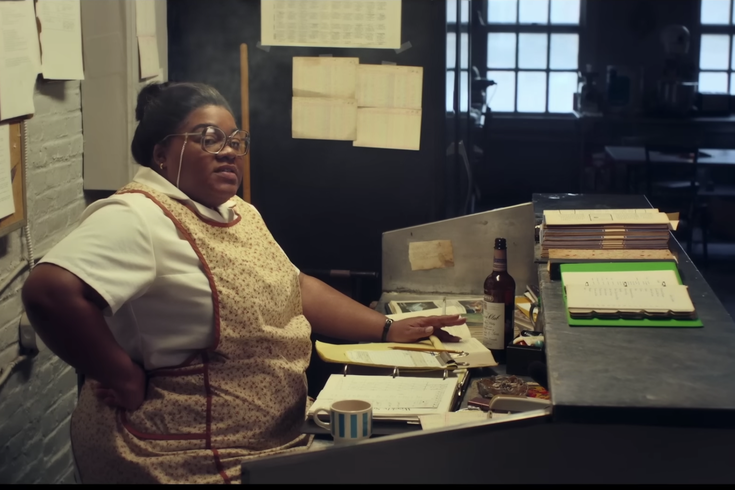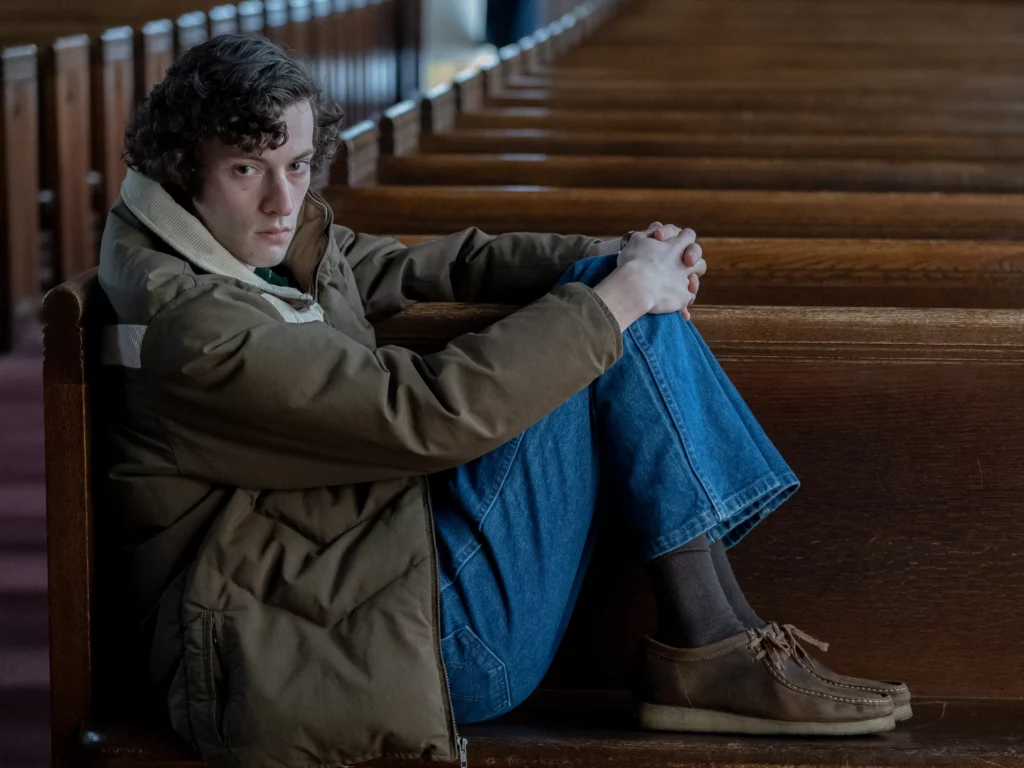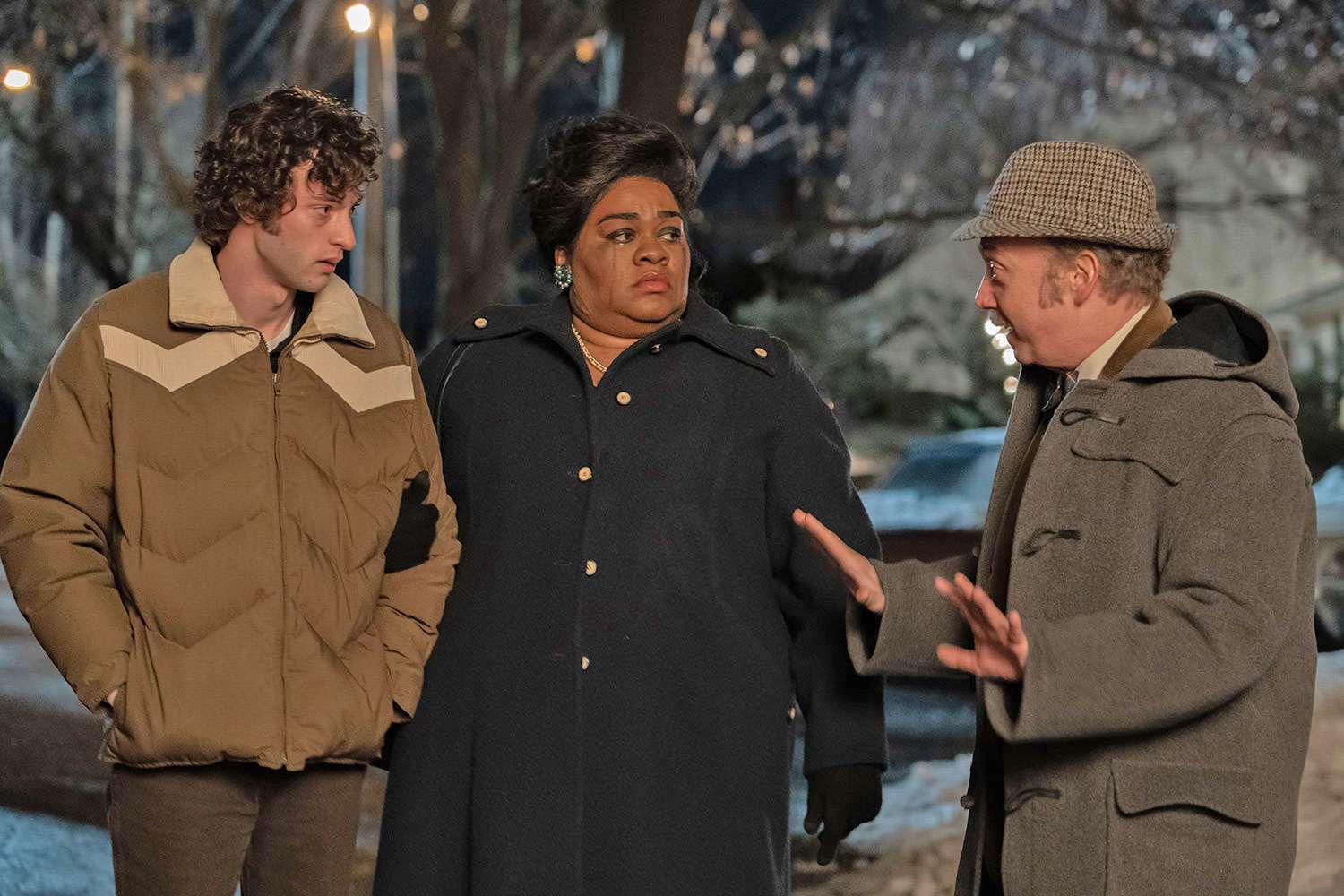The Holdovers, Alexander Payne’s wry, heartfelt new picture starring Paul Giamatti as an irascible New England boarding school instructor supervising a left behind student over Christmas break in 1970, is as much a loving nod to an era as a tale of a teacher and student coming to terms.
A deliberate throwback in both period design and narrative simplicity, Payne gets considerable mileage from a trio of smart characters, equally intelligent actors and an aesthetic that richly evokes, with bygone poignancy, the spirit of a lost time and place in America and the movies. He also tips his hat to Dickens’ A Christmas Carol, and well knows that the holidays are—for as many as not—a time of unhappy reflection to be endured, not enjoyed.
Written and produced by David Hemingson (Whiskey Cavalier), The Holdovers is deceptively straightforward—three sad people stuck together over a holiday, each nursing problems—but one from which Payne, with signature astute observation, elicits rich humor and pathos. More melancholy than mirth, the picture is foremost a showcase for the singular Giamatti, here returning to the fertile seriocomic vein he and Payne mined so effectively nineteen years ago in Sideways.

In that picture Giamatti was a know-it-all, frustrated writer and arrogant wine enthusiast; in this one he gets the plum role of a know-it-all, roundly disliked ancient history teacher and antiquities enthusiast ripe to be disabused of his high-handedness. His latter day Ebeneezer Scrooge incarnate Paul Hunham—one of the actor’s very best roles in a long line of grumps—imperiously dispenses failing exam grades and prattles on, frequently in Greek or Latin, about his students’ unlikely college careers, gleefully assigning heavy holiday reading on the Peloponnesian War a mere hour before Christmas break.
While the milieu may echo The Dead Poet’s Society, Giamatti’s Paul Hunham, ensconced for life at fictional Barton Academy, is anything but inspirational and deeply loathed by the student body, including his smartest student, the confident Angus Tully, played by newcomer Dominic Sessa with a striking combination of cockiness and vulnerability. Angus is headed off for a holiday in St. Kitts—that is, until a last minute phone call leaves him stranded at school, his mother jetting off to a private honeymoon with her new husband.
Both characters are well drawn archetypes—angry young man and jaded, caustic educator—yet Payne, with his considerable light touch gift for illuminating both the mordant and the tender in humanity, makes both men fresh and complex. Into this thorny dynamic comes a third character, played with no-nonsense authority by Da’Vine Joy Randolph, whose Mary Lamb, the school’s kitchen supervisor and head cook who has recently lost her only son to Vietnam, wishes the holidays to pass quickly and quietly.

This impromptu “family” dynamic (of the kind in which filmmaker Tom McCarthy specializes) yields rewarding returns, and if the structure of the film is expected—the trio, forced to spend two weeks together in near isolation, learn much about and ultimately from each other—it is delivered with such heart and professionalism it goes down easily. Credit Payne for assembling his pitch perfect ensemble, and the cast (including a nice cameo from Carrie Preston as a kindhearted faculty member) for striking a tone of such substantive, unsentimental comedy-drama, which springs to life in the picture’s second half upon an impromptu trip to Boston.
Loneliness is everywhere, never more than during a would-be festive Christmas Eve party where Mary’s grief finally comes to public flower. Yale drama grad Randolph (Dolemite is My Name), chain-smoking to The Newlywed Show while nursing an unsentimental trauma, is immensely affecting, never going for easy laughs or tears but instead achieving a measured, quiet gravitas. When she does finally break, back to the camera, the moment is all the more powerful.
For Hunham, whose gruff armor, whisky habit, lazy eye and inherited condition of trimethylaminuria that causes him to stink like fish late each day, there are past misgivings and one moment of real courage. And for young Angus, a festering wound over an out-of-the-picture father leads to exquisite reflection. Giamatti and Sessa sidestep the expected father-son stand in dynamics in favor of an averse, growing appreciation. Sessa, a Deerfield Academy high school discovery Payne handpicked, is an antithetical 2023 leading man but very much a swaggering, privileged 1970 prep school student in his wiry, pale, foppish visage; the young breakout nearly steals the film during a few late moments requiring some of the movie year’s saddest silences.

Ostensibly a Christmas feel good movie by way of hard won enlightenment, The Holdovers has a deeply serious streak that takes some time to reveal itself. You may find yourself laughing, as I did, before realizing that lump in your throat. To be honest, mine was as much about the film’s nostalgia for movies of yesteryear—simple human stories about people worth caring about—as its craft, replete with early 70s title cards, MPAA rating up front, gorgeous 35mm color negative saturation capturing the ivory, snow covered Massachusetts campus and the school’s warmly polished hues, richly textured grain palette and intentionally judicious specks of dust and dirt, as if running through an era-perfect Simplex projector. It is not merely an evocation an era, but feels of one.
3 1/2 stars



